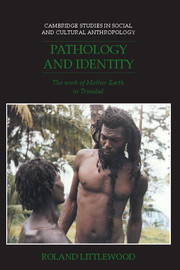Book contents
- Frontmatter
- Contents
- List of illustrations
- Preface
- Acknowledgements
- A note on idiom
- 1 The coming of the Earth People
- 2 A certain degree of instability
- 3 Madness, vice and tabanka: popular knowledge of psychopathology in Trinidad
- 4 Mother Earth and the psychiatrists
- 5 Putting Out The Life
- 6 Your ancestor is you: Africa in a new world
- 7 Nature and the millennium
- 8 Incest: the naked earth
- 9 The Beginning Of The End: everyday life in the valley
- 10 Genesis of meaning, limits of mimesis
- APPENDICES
- Glossary
- Notes
- List of references
- Index
- Cambridge Studies in Social and Cultural Anthropology
6 - Your ancestor is you: Africa in a new world
Published online by Cambridge University Press: 11 March 2010
- Frontmatter
- Contents
- List of illustrations
- Preface
- Acknowledgements
- A note on idiom
- 1 The coming of the Earth People
- 2 A certain degree of instability
- 3 Madness, vice and tabanka: popular knowledge of psychopathology in Trinidad
- 4 Mother Earth and the psychiatrists
- 5 Putting Out The Life
- 6 Your ancestor is you: Africa in a new world
- 7 Nature and the millennium
- 8 Incest: the naked earth
- 9 The Beginning Of The End: everyday life in the valley
- 10 Genesis of meaning, limits of mimesis
- APPENDICES
- Glossary
- Notes
- List of references
- Index
- Cambridge Studies in Social and Cultural Anthropology
Summary
If it don't have religion it dont have socialness.
Mother EarthThe persistence (and resistance) of African institutions in the West Indies
To what extent can we take Mother Earth's cosmogony as a purely personal vision? It might appear that we are able to distinguish here the simple manifestation of contemporary Creole patterns from more limited and selfconsciously ‘African’ representations and also from her own distinctive innovations. That may be neat, but mistaken. An ‘innovation’ is only an innovation within and against some continuing tradition out of which it develops, and from which individuals derive their images and concerns.
Such a continuing existence of the past in the present is an enduring concern for Caribbean studies in considering a society grounded in a particular moment of Western capitalism, a political history well documented since its inception. Scholarly literature on personal life in the West Indies follows two rather distinct lines of approach. Principally there is the synchronic study of the ‘matrifocal’ Black household, its individuals, sentiments and productive relations.
The second approach also considers contemporary social relations but is concerned with the extent to which existing patterns of experience and action among the Creole working class reflect those African societies from which the slaves were once torn. This latter area of debate was first laid out by Melville Herskovits in 1941 in his book The Myth of the Negro Past, where he developed its characteristic terminology – ‘syncretism’, ‘retention’, ‘survival’ and ‘reinterpretation’. He postulated a continuum of African retentions in African–American societies ranging from the Bush Negroes of Surinam (with maximal retention), through Haiti, the British West Indies, to the urban Blacks of the United States.
- Type
- Chapter
- Information
- Pathology and IdentityThe Work of Mother Earth in Trinidad, pp. 86 - 111Publisher: Cambridge University PressPrint publication year: 1993



